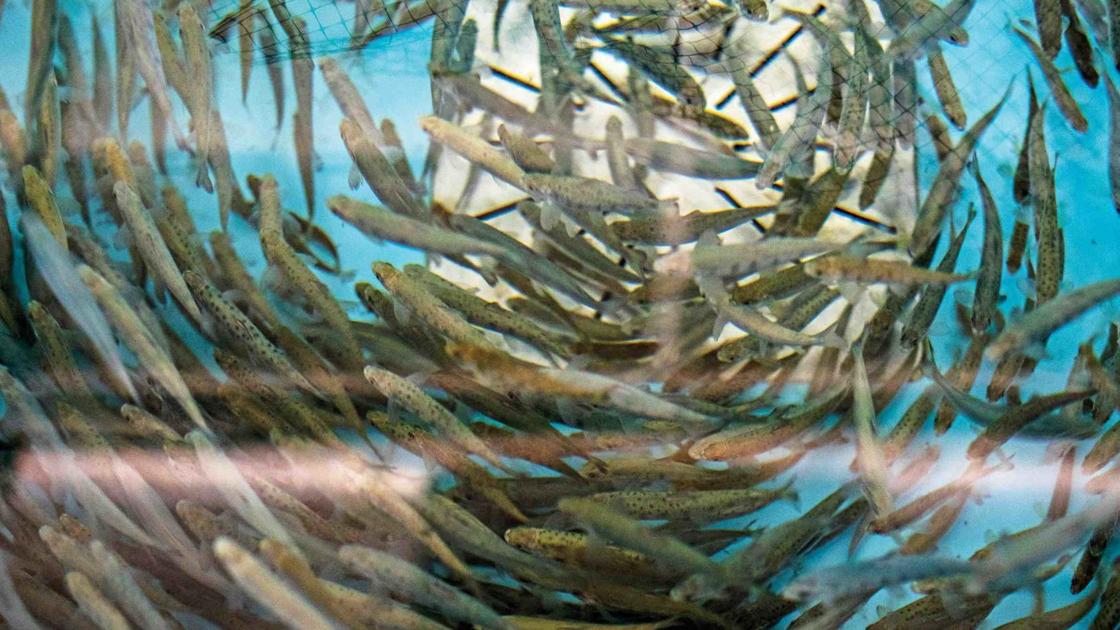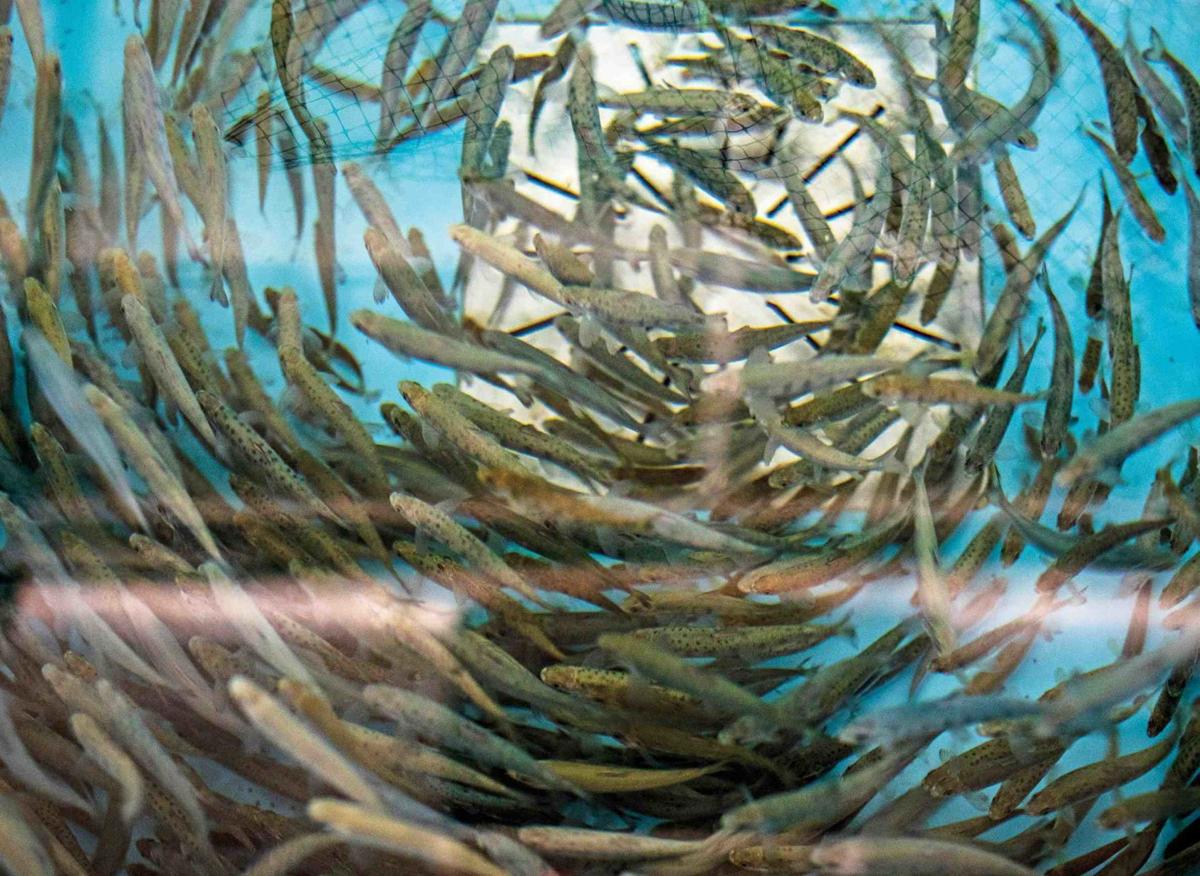

Farm-raised fish swim in a tank at UW-Stevens Point's Northern Aquaculture Demonstration Facility in Bayfield.
I don’t have the exact coordinates for the proposed fish farm in the Gulf of Mexico for which Hawaii-based Ocean Era Corp. is seeking a permit from the Army Corps of Engineers. But its reported location of “45 miles southwest of Sarasota” puts it smack dab in the middle of Florida’s fishing grounds, and where tens of thousands of Midwesterners, including Wisconsin natives, vacation every year.
Permitting this underwater monstrosity would be a tragedy.
A chain link cage, anchored to the sea floor 130 feet below, with 20,000 almaco jack fish packed like cattle, in an oversized bait ball of synthetic feed, waste and pharmaceuticals, would alter the ecology and pollute and deform the Eastern Gulf.
That the Corps would contemplate a permit is befuddling, considering what it already knows. A study published in Science Direct in December 2019 detailed the chronic accidents imperiling Norway’s offshore fish farm industry, including “mass mortality of fish during and after operations, introgression of genes (mixing with wild fish) from farmed salmon, the spread of disease and material damage to assets.”
The conservation group Friends of the Earth echoed the same dangers: “From the release of untreated fish waste and excess nutrients to the overuse of antibiotics and endangerment of marine life, industrial ocean fish farms are nothing but bad news for our oceans.”
Ocean Era itself acknowledged that in their other existing farm off Hawaii, which they saturate with thousands of gallons of hydrogen peroxide, “leakage” is common and escape risk “high” for the penned fish invariably infected with “skin fluke parasites.” They also admit to hazards for large fish and mammals (dolphins and whales) attracted to the cages that can become trapped inside and die, as happened recently with an endangered tiger shark and a monk seal.
Ocean Era argues that aquaculture would make the United States less dependent on imported seafood. But countering their argument was a report just last week that more humpback whales are being observed off the coast of New York than ever before, as they feed on massive schools of menhaden that have finally returned.
Scientists say New York’s bounty is due to cleaner water and stricter conservation laws, which is what the focus of the Army Corps and the federal government should be for increasing domestic fish stocks, instead of polluting the Gulf with farms to make inorganic “seafood.”
As a sportsman and a human being, I plead also in behalf of the caged fish. Fishermen respect nature and appreciate the intelligence, complexity and intrinsic value of the Gulf’s inhabitants.
As a freshwater and saltwater fisherman, I know the freedom, speed and magnificence of the nearer dwelling amberjack, to which the almaco jack is a close cousin. Amberjack can grow to 80 pounds. It is an offshore pelagic, a silvery torpedo high in the food chain that prowls the open ocean for prey (not pellets) in depths of 800 to 1,000 feet.
But in Ocean Era’s net pens, these fish cannot roam. They are confined in a shallow and unaccustomed depth, leading an artificial, immured existence before being slaughtered and frozen for shipment.
Finally, the pristine character of the Gulf of Mexico must be preserved. The sea is the last frontier where sportsmen, tourists, their grandchildren and, hopefully, great grandchildren, may encounter wilderness, solitude and wonder.
Imagine sailing over hills of sparkling blue water, accompanied by platoons of dolphin and frigate birds with an 8-foot wingspan soaring overhead. Flying fish glide iridescent in your wake, and curious loggerheads surface to investigate. Even an atheist might suspect that this is where God, if he or she exists, would reside.
Or imagine you are vacationing in Yellowstone National Park, exhilarating in the mountains, rivers and wildlife, when your path is suddenly blocked by a barbed wire corral imprisoning 20,000 cramped, sedentary bison.
In the same way, a 24/7 barge parked over a submerged fenced-in enclosure boiling with disoriented fish and a festering stew of contaminants destroys our Gulf wilderness.
In jeopardizing our seascape and its cleanliness, the Ocean Era fish farm may pose an even more serious threat to Florida tourism, the state’s number one industry, than the grotesque and dangerous oil rigs which the state has been successfully fending off its west coast for decades.
Denying Ocean Era a permit may seem like a no brainer. But the current federal administration has shown its preference for private industry profits over environmental health. The president’s executive order just last May removed federal restrictions on aquaculture.
I urge readers nationwide to make their views known by sending comments (before Nov. 4) to the United States Army Corps of Engineers using this email address: OceanEra_VEaquaculture@usace.army.mil.
A contributing columnist for Hayward's Sawyer County Record, David McGrath is the author of "South Siders." Reach him at profmcgrath2004@yahoo.com.
Share your opinion on this topic by sending a letter to the editor to tctvoice@madison.com. Include your full name, hometown and phone number. Your name and town will be published. The phone number is for verification purposes only. Please keep your letter to 250 words or less.
Get opinion pieces, letters and editorials sent directly to your inbox weekly!
October 27, 2020 at 02:00AM
https://ift.tt/34x3Yc8
David McGrath: Caged, farmed fish will destroy the pristine Gulf - Madison.com
https://ift.tt/35JkYuc
Fish
No comments:
Post a Comment